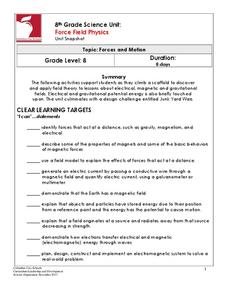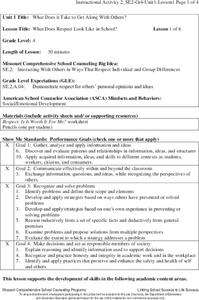Humane Education Advocates Reaching Teachers
Justice for All - Educating Youth for Social Responsibility: Grades 6-8
Teach middle schoolers how to develop healthy relationships with activities and lessons designed to create a kind and inclusive
classroom. Pupils create guidelines to develop a safe and civil learning environment. They learn how to...
Texas State Energy Conservation Office
Fueling the Future
Future mechanical engineers and automotive technicians read about various solutions to using gasoline in cars. Included are electric, fuel-cell-powered, and hybrid vehicles.
NASA
Erosion and Landslides
A professional-quality PowerPoint, which includes links to footage of actual landslides in action, opens this moving lesson. Viewers learn what conditions lead to erosion and land giving way. They simulate landslides with a variety of...
Columbus City Schools
Force Field Physics
Attracted class members to an activity-packed journey through the science behind the invisible forces at work all around us. From jump rope generators to junkyard wars, there's never a dull moment when eighth grade physics scholars...
Old Dominion University
Introduction to Calculus
This heady calculus text covers the subjects of differential and integral calculus with rigorous detail, culminating in a chapter of physics and engineering applications. A particular emphasis on classic proof meshes with modern graphs,...
Read Write Think
Book Report Alternative: Rewind the Plot!
Have you ever looked for a new way to teach an old concept? Scholars thinking about the rising action of a story in a whole new perspective. However, Book Report Alternative: Rewind the Plot! challenges readers and allows for much...
EngageNY
End of Unit Assessment: Making Connections between Song Lyrics and Texts
For the end-of-unit assessment, scholars engage in small group Socratic seminars to connect the lyrics of two songs to texts they read and studied. They discuss how the songs "Ain't Gonna Let Nobody Turn Me Around" and "Lift Every Voice...
Missouri Department of Elementary
What Does Respect Look Like in School?
What does it mean to be respectful? Scholars complete a self-assessment worksheet to determine just how respectful they are. Next, they choose three items from the survey and write plans for how to improve in those areas.
EngageNY
Discussing and Identifying Themes: What Makes a Good Children’s Book?
Working in small groups, scholars look closely at a children's book to evaluate narrative techniques. Next, they complete a Children's Book Scavenger Hunt worksheet to analyze the literary elements of their selected stories.
EngageNY
End of Unit 2 Assessment, Parts 1A and 1B: Fishbowl on Screen Time and Adolescents
Here's a surefire way to ensure that class discussions go swimmingly! Using the resource, scholars participate in a Fishbowl activity, forming two concentric circles in the classroom. As the group on the inside of the fishbowl discusses...
PBS
Code Creators
The lesson is real—even if the computer code isn't. Scholars learn about pseudocode, which simulates computer code using everyday language. They write pseudocode for simple actions, then have classmates guess the action from the written...
EngageNY
Explaining the Relationships between Events in a Historical Text: Contextualizing the History of Baseball (pages 8–9, 25)
In other words ... it's time to give a summary. Scholars work with a partner to paraphrase a timeline card referring to Promises to Keep. They then work to merge the two timelines to create one timeline. Pupils finish by writing a...
PBS
Signal Senders
Send a signal to let others know one's location. Scholars investigate how scientists track the movement of marine wildlife. They model the process by creating a custom sound that can be used to identify each group member as they walk by.
PBS
Curious George: Five Senses
Curious scholars make like Curious George and use their five senses to identify mystery objects. After a brief discussion, learners watch an engaging Curious George video in preparation for an activity. Scholars visit three tables that...
PBS
Curious George: Fan and Blow
What kind of wind works best to make things move? After watching a short video from Curious George, super scientists answer the question by testing various wind-making tools. Learners observe, record, and share their findings.
PBS
Curious George: Water Drops
A short video features Curious George playing with pots filled with colored water. Scholars then take to colored water with eye droppers and observation skills. They examine what happens to water drops when dropped from different...
K20 LEARN
Antigone's Themes Today: The Greek Drama Antigone
Is Antigone relevant to today's readers? After reading Sophocles' tragedy, scholars must decide if the themes are universal and timeless. Class members engage in a series of activities designed to have them closely consider the...
Santiago Canyon College
Taking Notes for Science Class
Provide young scholars with the tools they need to succeed with this reference on the Cornell note-taking strategy. By breaking the content of lessons into main ideas, supporting details, and overall summaries, students are able to...
Museum of Science
Skyscraper Engineering
The sky's the limit when learning about engineering. Future engineers conduct an activity to learn about forces associated with skyscrapers. They design and build a model of a skyscraper from basic household materials, then test their...
Museum of Science
Make a Map
It's important to know the final destination. Scholars first measure distances in a region of interest using a standard measuring device or by counting steps. They then use an appropriate scale and graph paper to create a map of the...
Museum of Science
Terrarium
Make a premium terrarium. Learners create a miniature terrarium to study ecosystems. They use a clear container, along with rocks, soil, moss, leaves, woodland plants, earthworms, and bugs to construct their terrariums.
Museum of Science
Gum Chemistry
Gum be gone! Scholars conduct an experiment to find the best substance that would help remove gum from the bottom of a shoe. They test peanut butter, petroleum jelly, olive oil, vinegar, and rubbing alcohol in their experiments.
Museum of Science
City Circuit
Here's an electric lesson on electricity. Pupils create an electric circuit to model a city's electric system. They then test out different materials to see whether they are conductors of electricity.
Museum of Science
Sound Design
Hear about a great resource on sound? An interesting hands-on activity has learners construct a device that will soundproof a phone or speaker. They test out different materials to see which ones best absorb sound waves.
Other popular searches
- Stem and Leaf Plots
- Stem Cells
- Stem and Leaf
- Brain Stem
- Stem Cell Research
- Roots, Stems and Leaves
- Stem and Leaf Plots
- Roots Stems and Leaves
- Cell Biology Stem Cells
- Plant Stems
- Flower Stems
- Human Stem Cells

























